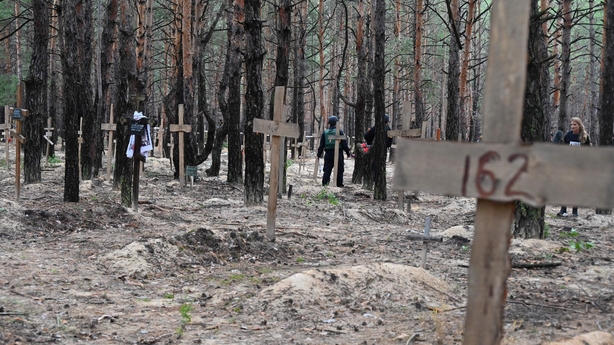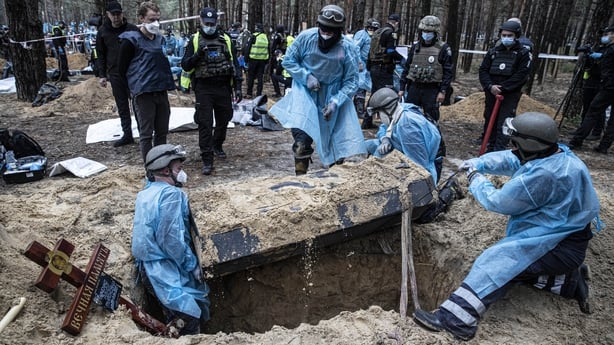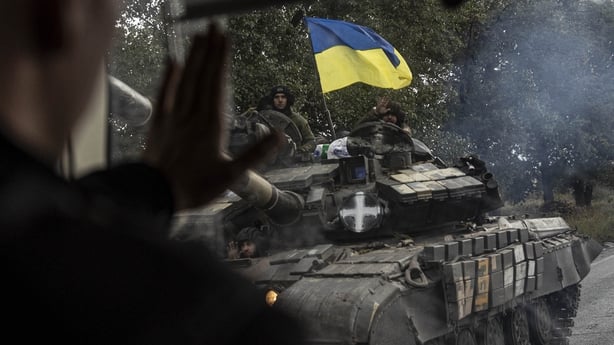Ninety-nine percent of bodies exhumed from a mass burial site in northeastern Ukraine in territory recaptured from Russian forces had signs of a violent death, Ukraine's regional administration head has said.
Ukrainian officials said they had found 440 bodies in woodlands near the city of Izium. They said most of the dead were civilians, and that the site proved war crimes had been committed by Russian invaders who occupied the area for months.
"Among the bodies that were exhumed today, 99% showed signs of violent death," Oleg Synegubov, head of Kharkiv's regional administration, said on social media.
"There are several bodies with their hands tied behind their backs and one person is buried with a rope around his neck.
"Obviously, these people were tortured and executed."

Speaking from the site, Kharkiv Governor Oleh Synehubov said each fact "will be investigated and will be properly and legally evaluated".
Men in white overalls were digging out bodies at the site in a forest where around 200 makeshift wooden crosses were scattered among trees. Some 20 white body bags could be seen.
President Volodymyr Zelensky said many Ukrainians were buried at various sites in the newly-recaptured northeast including whole families and people who were tortured, likening the aftermath to Russia's withdrawal from near Kyiv months ago.
In an interview at his presidential office, he said an investigation was under way with international assistance and that there was evidence of Russian war crimes in those areas.
The United Nations human rights office plans to send monitors to the area.
"Our colleagues in Ukraine are following up on these allegations, and they are aiming at organising a monitoring visit to Izium to determine the circumstances of the death of these individuals," spokeswoman Elizabeth Throssell said.
She added that the team was hoping to visit the northeastern city "soon".

The site in Izium, a former Russian front-line stronghold, would be the biggest mass burial found in Europe since the aftermath of the 1990s Balkan wars. Ukrainian forces retook Izium after thousands of Russian troops fled the area, abandoning weapons and ammunition.
Ukrainian police chief Ihor Klymenko told a news conference all of the bodies recovered so far at the site appeared to be of civilians, although there was information that some soldiers might have been buried there too.
"For months a rampant terror, violence, torture and mass murders were in the occupied territories," President Zelensky's adviser Mykhailo Podolyak tweeted in English, above photos showing a muddy pit taped off with red-and-white crime-scene tape.
"Anyone else wants to 'freeze the war' instead of sending tanks? We have no right to leave people alone with the Evil."
Russia denies that its occupation forces have committed atrocities. The head of the pro-Russian administration which abandoned the area last week, Vitaly Ganchev, was quoted by Russia's TASS state news agency as accusing Ukrainian forces of being responsible for killings and trying to blame Moscow.
"It was obvious to us that Ukraine would try to repeat the Bucha scenario. Now we have that in Izium," he said, comparing the situation to a city north of the capital Kyiv where hundreds of bodies were found after Russian forces fled in March. Moscow has said those killings were staged by Ukraine, an accusation rejected by Kyiv and international investigators.
A mass burial was found in Izyum, Kharkiv region. Necessary procedures have already begun. All bodies will be exhumed and sent for forensic examination. Expect more information tomorrow.
— Andriy Yermak (@AndriyYermak) September 15, 2022
Russia is a murderer country. A state sponsor of terrorism. pic.twitter.com/7pKTrYvlUF
Blood on the floor
In Kupiansk, a northeastern railway junction city whose partial capture by Kyiv's forces on Saturday cut Russia's supply lines and led to the swift collapse at the front, small units of Ukrainian troops were securing a nearly deserted ghost town.
A formerly Russian-occupied police station had been hastily abandoned. Russian flags and a portrait of President Vladimir Putin lay on the floor amid broken glass. Records had been torched. Behind the steel doors of the station's jail cells there was blood on the floor and stains on the mattresses.
Three piglets on the loose from an abandoned sty were foraging in the city street. Serhiy, a middle-aged man in a thin jacket, was hungry for news.
"There's no electricity, no phones. If there were electricity, at least we could have watched TV. If there were phones, we could have called our relatives," he said.
After a week of rapid gains in the northeast, Ukrainian officials have sought to dampen expectations that they could continue to advance at that pace. They say Russian troops that fled the Kharkiv region are now digging in and planning to defend territory in neighbouring Luhansk and Donetsk provinces.
"It is of course extremely encouraging to see that Ukrainian armed forces have been able to take back territory and also strike behind Russian lines," NATO Secretary-General Jens Stoltenberg told BBC radio.
"At the same time, we need to understand that this is not the beginning of the end of the war. We need to be prepared for the long haul."

Mr Putin has yet to comment publicly on the battlefield setback suffered by his forces this month. Ukrainian officials say 9,000 sq km have been retaken, about the size of the island of Cyprus.
Ukraine has also launched a major offensive to recapture territory in the south, where it aims to trap thousands of Russian troops cut off from supplies on the west bank of the Dnipro river, and retake Kherson, the only large Ukrainian city Russia has captured intact since the start of the war.
Russia's state-run RIA news agency released video showing smoke billowing from Kherson's Russian-occupied administration building after apparent Ukrainian rocket attacks.
Kirill Stremousov, the Russian-installed deputy head of the region, told Russian state TV that one wing of the building had been practically destroyed, and there were dead and wounded though it was too soon to say how many. Ukrainian officials did not immediately comment.
In the east, the chief prosecutor of the pro-Russian separatist administration in Luhansk was killed by an explosion in his office, along with his deputy, according to Russian news agencies. Pro-Russian authorities said a husband and wife working to arrange a referendum on joining the southern city of Berdiansk to Russia had also been killed overnight.
Russia also reported strikes across the border in its Belgorod region.
Bucha 'not an isolated incident' - Coveney
Minister for Foreign Affairs Simon Coveney said that Bucha was "not an isolated incident" and other areas under Russian control that have been liberated are showing "similar horror stories of civilians, as well as soldiers, in mass graves".
Speaking on RTÉ's Morning Ireland, he said he expects there will be brutalised bodies found, as was the case in Bucha.
It is a reminder, he said, of what this war is about and why Ireland and so many other countries have taken such an interest and involvement in Russian aggression in Ukraine and why Ukraine needs support and assistance.
His comments come after his recent visit to Odesa in Ukraine. It was his second visit to the war-torn country since the Russian invasion began in February.
'This is a reminder of what this war is about and why Ukraine needs our support and assistance,' Minister for Foreign Affairs Simon Coveney said after Ukrainian authorities found a mass grave in the recaptured city of Izium | Read more: https://t.co/I6RkWBRddU pic.twitter.com/yJzqMldc2g
— RTÉ News (@rtenews) September 16, 2022
Mr Coveney said Ireland has made an extra €3 million available so the International Criminal Court can assemble the evidence they need across Ukraine to take a case successfully on the basis of war crimes and potentially crimes against humanity.
"They are the kind of conversations we will have next week in both the UN General Assembly in New York and the UN Security Council," he said.
"We have seen the Ukrainian military make extraordinary gains. They have taken back about 7000 square kilometres over the last four or five days, which, of course, from the Ukrainian point of view is hugely encouraging, managing to push the Russian forces back retaking territories.
"But unfortunately, what that has exposed in Izium is the brutality of war and what Russian forces, it seems, is responsible for in terms of brutalisation of civilian populations."
